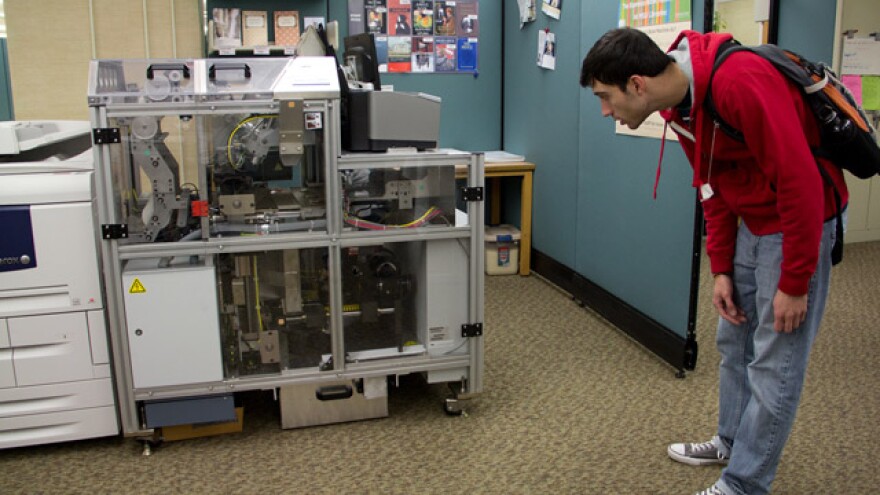This week, reWorking Michigan looks at printing and self-publishing. With the help of high-speed printers like the Espresso Book Machine, printing a book has become fast, easy, and inexpensive.
DIY publishing arrives at MSU
Maybe you've always thought you have a book inside you, just waiting to be written. Maybe what's holding you back is a fear of doing all that work and then not finding a publisher.
In the past, the only solution was a vanity press. For a fee, you can get your work printed in book form. Before going that route, you need to weigh the cost of shipping and the number of copies you might be required to order against how many copies you might sell, and at what price.
Now, do-it-yourself book publishing has arrived at the Michigan State University Library's copy center.
"There is a Xerox high-speed copier that uses black and white technology to print the inside of it," says Espresso Book Machine coordinator Kyle Pressley. "The cover prints on a professional grade, photo quality printer, color; the EBM itself is the part that binds it and trims it and glues it; and then there's a computer that runs the whole business."
A 200-page book prints from start to finish in about five minutes, depending on the graphics being used. You get a paperback that most people won't be able to differentiate from those you'll find in any bookstore.
Pressley says a printing project can be done in a matter of days, where a vanity press could take weeks or months to complete.
Machine allows changes to future editions
East Lansing playwright and librettist Sandra Seaton is using the Espresso Book Machine to print 50 copies of her play, Music History. She had an earlier play published in an anthology, but it isn't her favorite version of it; already published, she can't go back and revise it. Printing Music History this way will allow her to make her own changes in future editions.
"The play has had one production," Seaton explains. "I hope to have more, and this gives me an opportunity to see it and to get it out there. People will use it in their courses, but then I can always go back and fine-tune it. I wouldn't want it published anywhere that it was just permanent and something that I couldn't go back and tweak."
Seaton hopes having her play in book form will increase her chances of having theater companies produce Music History.
The MSU Library has done more than print her book; she found the cover photo in the MSU archives, and she also got help with the graphics.
The nuts and bolts - and glue
A writer needs to provide two "pdf" files. One is for the cover art and the other provides the text. The cover and the text print at the same time, and coordinator Kyle Pressley says everything meets in the middle of the machine.
"The glue is applied and the pages are roughed up so the glue sticks," Pressley says. "And then it applies the pages to the cover, and it squeezes it to make sure to set the bond. It'll set for about 30 seconds so the glue will set, and from there it goes down to the trimming station. It will trim the top, the bottom and side opposite of the spine, and then it spits it out the back."
Along with authors and playwrights, Pressley sees a potential market for use by faculty and students. For example, a graduate who has written a dissertation can have it printed in book form to hand over during a job interview.
As for cost, Pressley says he recently ran off 30 copies of a 70-page book. The fee came to $250.
One other feature of the machine is the printing of books that otherwise are not available. In some cases, the library only has a digital copy of a rare book, but it can be printed and bound for a fee.
The "cool" factor of warm pages
In the end, there's the "cool" factor of seeing that first copy of your book come out of the Espresso Book Machine. Sandra Seaton watched the first copy of Music History drop out, and held it's still-warm pages in her hands.
http://www.youtube.com/watch?v=_o9c9vwDe4Q
PHOTO ESSAY: Vanity Press and the Book Machine reWorking Michigan visits the Michigan State University Main Library as playwright Sandra Seaton prints copies of her latest play using a high-speed printer called the Espresso Book Machine. Reporter: Scott Pohl | Photos: Kenita Nichols, Marites Woodbury | Editor: Jennifer Thielen
reWorking Michigan examines our evolving economy, as citizens of the Great Lake State explore new ways to make a living and build a future for their families.



